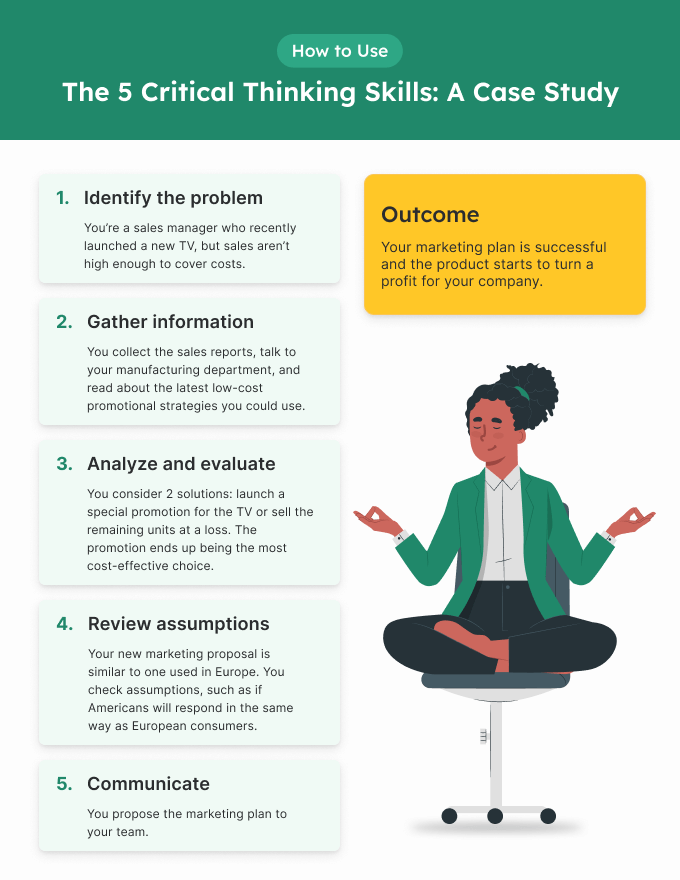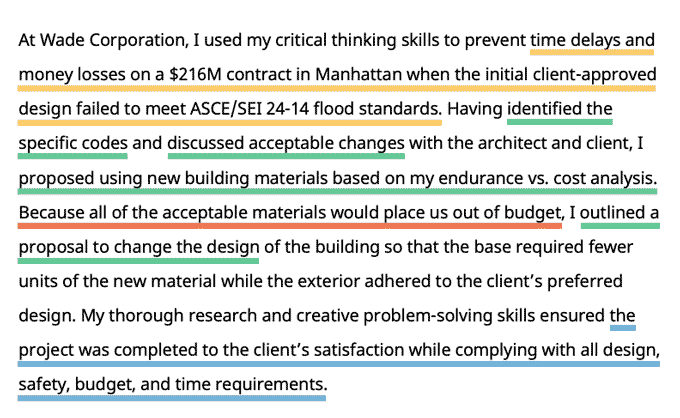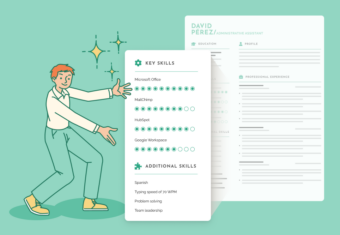What is critical thinking?
Critical thinking is arranging information in a clear and organized manner to make decisions.
Critical thinking skills are important for solving problems in your daily life, such as deciding whether to buy a house or coordinating a family reunion. And critical thinking skills are also useful when looking for a job, excelling at work, and advancing in your career.
Employers value candidates who can use their robust critical thinking skills to help:
- fix problems
- make improvements
- innovate in new areas
Additionally, because critical thinkers are naturally independent thinkers, they’re valuable employees who don’t need much training or continuous supervision.
Keep reading to learn:
- How to think critically
- Critical thinking skills examples
- How to demonstrate critical thinking skills when applying for a job
- How to improve your critical thinking skills
How to think critically
Generally, successful critical thinkers use these 5 critical thinking skills to solve problems:
- Identifying problems
- Gathering information
- Analyzing and evaluating
- Reviewing assumptions
- Communicating
Here’s how to apply these skills in the critical thinking process:
1. Identify the problem
Identifying the problem means that you determine the root of the problem, not effects of the problem or related but less important problems. It also involves defining the specifics of the problem.
For example, if you’re thinking critically about where to go for a group dinner, the specifics would include finding a restaurant that fits everybody’s budget and can handle a large group of people.
2. Gather information
Gathering information requires collecting all relevant and reliable information. Sources of information can include:
- data
- articles and books
- discussions with others (including experts in the area and people directly involved with the problem)
3. Analyze and evaluate
Analyzing involves using the information you’ve collected to come up with reasonable solutions to your problem. You evaluate each solution based on how:
- well it solves the problem
- much it would cost (in time, money, and resources) vs. its benefits
- it would affect everyone involved
4. Review assumptions
Assumptions are needed for thinking critically about any problem. For example, to design an airplane, everyone on the team must assume that gravity is real.
As a result, your aim at this critical thinking stage should be to evaluate whether your assumptions are valid — or instead based on biased or false information.
5. Communicate your thinking to others
Once you’ve made a decision, present your solution and rationale to others. Known as the protégé effect, explaining what you’ve learned to another person checks and strengthens what you understand about a situation. Additionally, other people can verify the assumptions, logic, and usability of your solution as well as give you solutions you may not have thought of.
Below is an example of the 5 critical thinking skills in action:

Critical thinking skills examples
You probably use critical thinking more than you realize. Generally, any thinking that involves processing information from multiple sources requires critical thinking.
Some specific examples of critical thinking skills in the workplace include:
- Identifying important information
- Using facts instead of opinions
- Determining whether information is reliable
- Weighing pros and cons
- Predicting
- Comparing and contrasting
- Designing new solutions to issues
- Decision-making
- Simplifying problems or situations
- Making connections
- Building arguments
- Adapting to a growing workload
- Cost-benefit analysis
- Data interpretation
- Evaluating information and drawing conclusions
- Maximizing results with minimal effort
- Asking targeted questions
- Big-picture thinking
- Noticing discrepancies
- Giving constructive feedback
- Research
- Staying on-topic
- Forming theories
- Creating tests to answer questions
How to demonstrate critical thinking skills when applying for a job
When it comes to knowing what skills to put on your resume, remember that you need a balance of soft and hard skills. Critical thinking is one of the essential soft skills you need to succeed at work. Compared to hard skills (those learned through education and training), soft skills are harder to demonstrate to employers during the hiring process.
We provide some tips with examples for how to make your critical thinking process come through on your resume, in your cover letter, and during interviews.
On your resume
When you write a resume for a role that requires critical thinking, you should first showcase this skill in your resume’s introduction and skills section. However, the best way to convince employers of your critical thinking skills is by giving examples of how you’ve used them in your resume’s work experience section.
Employers are more likely to believe and be impressed if you show what results you’ve achieved through critical thinking. So quantify your resume by using hard numbers when providing examples of critical thinking in the workplace, like the following example does:
Synthesized clothing market trends, past year sales, delivery time, and inventory levels to accurately forecast buying, resulting in a 20% decrease in incidences of stockouts and overstocks from the previous year
Also, you should use resume action verbs related to critical thinking skills. Here are examples of action verbs that emphasize your ability to think critically:
Critical Thinking Action Verbs
| Analyze | Evaluate | Identify | Interpret | Calculate |
| Review | Explain | Advise | Persuade | Address |
| Plan | Brainstorm | Anticipate | Forecast | Resolve |
| Research | Organize | Integrate | Comprehend | Apply |
| Synthesize | Compare | Link | Outline | Hypothesize |
| Judge | Experiment | Check | Summarize | Infer |
| Classify | Deduce | Estimate | Test | Reason |
In your cover letter
If critical thinking and problem solving are major parts of your target role, you may want to dedicate a full paragraph to describing an example of your critical thinking in your cover letter. To do this, you can write about the critical thinking skills you described in your resume’s bullet points, adding more details and examples.
Extra details about your critical thinking skills include:
- the significance of the problem, and why it was difficult to solve
- the specific kind of critical thinking skills you used (e.g., comparing and contrasting, calculating, cost-benefit analysis, troubleshooting)
- any issues that complicated the problem-solving process
- the results of applying your solution
See how an applicant for a civil engineering position shows their ability to think critically in their cover letter. We’ve underlined the sections in colors that match the above information to show how the applicant added extra details about their critical thinking skills:

During interviews
Employers often ask behavioral interview questions to test your critical thinking ability in interviews.
For instance, an interviewer may ask you to provide an example of a time you used critical thinking in a past work experience (like “Tell me about a time you had to make a hard decision”).
Other questions will present you with a scenario and ask you to apply critical thinking to solve it.
Answer these interview questions by going through each of the 5 steps in the critical thinking process.
Here’s an example of how a restaurant manager candidate might show superior critical thinking skills in response to the question, “If multiple front-of-house staff call out sick, what would you do to ensure everything in the restaurant runs smoothly?”
1. Identify the problem: “If we’re short-staffed, then we won’t be able to accommodate as many diners overall and it will harm future business if customers are dissatisfied with slow service.”
2. Gather information: “I’d find out how many back-of-the-house staff are also trained to wait tables and how many servers our sister restaurant can lend to us on short notice.”
3. Analyze and evaluate: “If our sister restaurant can loan us enough servers, we’ll continue dinner service as normal. But if we’re still short-staffed, I can talk with the back-of-the-house about how we can streamline their work to make overall wait times shorter, such as by simplifying our menu offerings or front-loading food preparation as much as possible before opening.”
4. Review assumptions: “I’d also have to consider what day of the week it is. If it’s a non-Friday weekday, we may be able to accommodate our usual number of customers if the managers and hostess staff take on more serving responsibilities.”
5. Communicate your thinking: “Finally, I’d let the team know that we’re short-staffed and gather their ideas for how we can make service seamless. They can help approve my plan to borrow servers and reallocate job responsibilities.”
How to improve your critical thinking skills
Building critical thinking skills is so valuable because thinking critically is a transferable skill — you can apply it to any type of problem in any field. While it may seem that some people are better critical thinkers than others, remember that critical thinking is a skill that can be developed with practice.
Follow the below tips to improve your critical thinking skills:
- Read widely from multiple sources
- Ask questions (especially open-ended questions that can’t be answered with a simple “yes” or “no”)
- Take critical thinking courses
- Learn how to use critical thinking strategies (e.g., scientific method, SWOT analysis)
- Avoid common logical fallacies and thinking traps
- Practice solving puzzles
Additional skills for your resume
Here are more skills to include on your resume to make it more compelling:
Click to rate this article
4.2 Average rating















